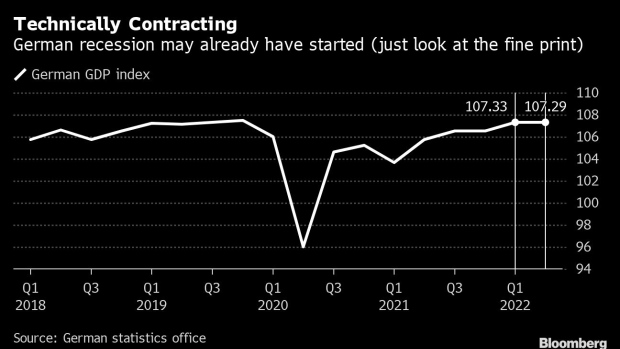Jul 29, 2022
German Recession May Have Started, Even If Rounded Data Say Otherwise
, Bloomberg News

(Bloomberg) -- Germany, Europe’s largest economy, may already be in a recession.
Output officially stagnated in the second quarter, the statistics office said Friday, but looking beyond the first decimal point, it actually shrank by 0.04%.
Another decline in the current three-month period is likely as limited natural gas deliveries from Russia prompt companies and households to brace for possible winter shortages. Economists from Credit Suisse and Deutsche Bank have been predicting quarterly contractions from the second half through at least spring.
A country is commonly said to be in a recession when gross domestic product falls for two consecutive quarters.
Listening to the warnings of corporate Germany over the past weeks, the outlook is gloomy: Energy giant Uniper SE was forced into a 17 billion-euro ($17.3 billion) rescue package last week, and one in six industrial firms plan to cut production or partially suspend operations because of surging costs.
Persistent chip shortages will halt production at a Mercedes-Benz plant next week, while dwindling consumer confidence may worsen if inflation remains elevated — as predicted by the Bundesbank.
Germany’s economy will probably grow 1.2% this year and 0.8% in 2023, the International Monetary Fund said this week in a downgrade to earlier projections.
Read more...
-
France, Spain Smash Estimates Despite Recession Fear: GDP Update
-
German Hopes of Avoiding Recession Are Shrinking by the Day
- Germany Approves $180 Billion Funding to Accelerate Energy Shift
©2022 Bloomberg L.P.